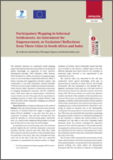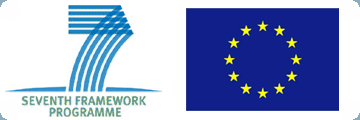|
Opinion - July 2014
By Catherine Sutherland, Véronique Dupont and David Jordhus-Lier
The extensive literature on community based mapping argues that both the processes and products of co-produced spatial knowledge are supportive of more inclusive development (Hordijk, 1999; Chambers, 2006; Elwood, 2006; Rambaldi et al, 2006). Participatory mapping changes access to and ownership of information (Elwood, 2006), it fosters learning and engagement between ‘experts’ and communities, it can build community cohesion (Hordijk, 1999) but it can also lead to conflict and exclusion (Chambers, 2006; Elwood, 2006). The power of community based maps in changing development outcomes, and the conditions under which these maps are empowering or exclusionary requires further research. This paper reflects on participatory mapping processes in three cities namely Durban, Cape Town and Delhi where community ‘mapping’ has achieved different outcomes.
Ocean Drive-In is an informal settlement in the north of Durban. When the Chance2Sustain research team from the University of KwaZulu-Natal first began to engage with Ocean Drive-In residents it was clear that they were a community ‘in-waiting’. They had been informed that they would be relocated to a formal housing project, Hammonds Farm, as a result of their settlement being located on private land, but they did not know when this would happen.
Read more on Participatory Mapping in Informal Settlements
|
Recent Chance2Sustain PublicationsMegaprojects and Urban Development in Cities of the South by Loraine Kennedy et al.
Traveling Concepts in Megaproject Building by Loraine Kennedy and Glen Robbins
Sustainable Data Science for Sustainable Cities: Big Data and the Challenge of Urban Development by Linnet Taylor
Participatory Mapping in Informal Settlements: An Instrument for Empowerment, or Exclusion? Reflections from Three Cities in South Africa and India by Catherine Sutherland et al.
Mapping as Tool to Understand Urban Inequalities by Isa Baud and Karin Pfeffer |
|
|
|
|
|

